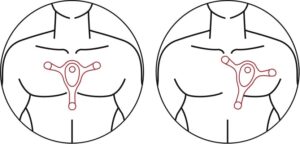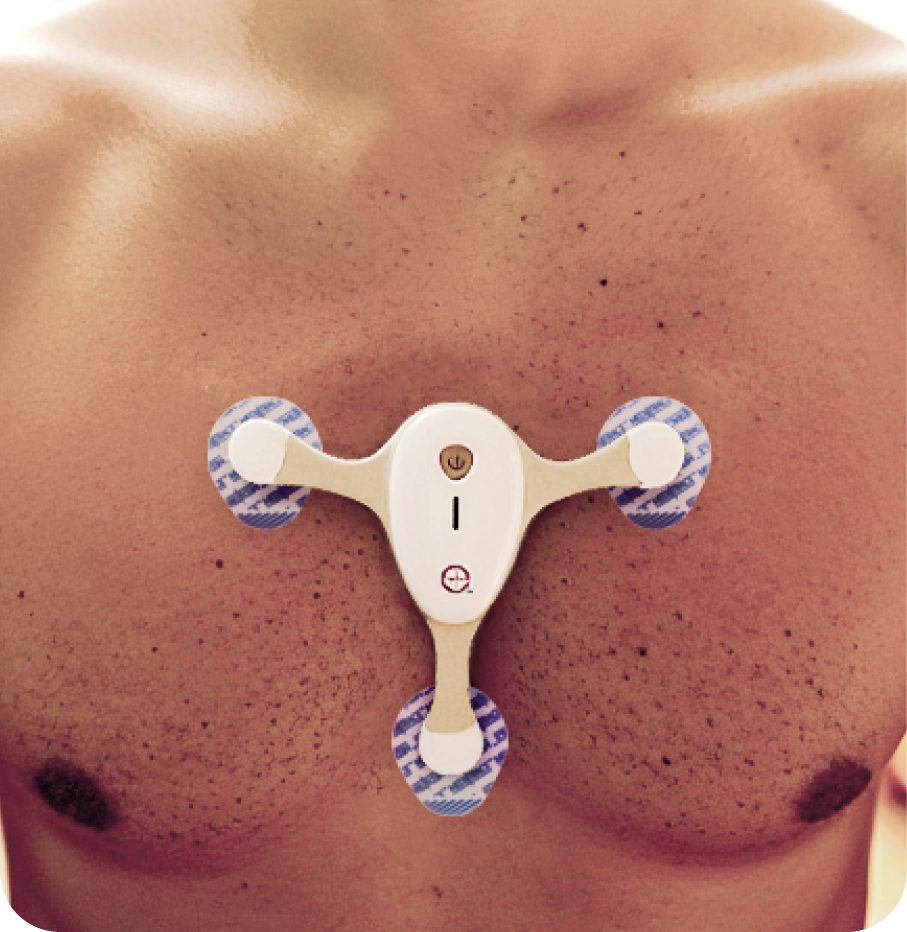Heart rhythm monitoring with comfort, without changing your daily routine.


Light and flexible

Wireless

Water-resistant
20 million people have arrhythmias, but only 2 million are diagnosed each year. 12, 13, 14

Real-time symptom recording

No wires, automatic Bluetooth connection

Loose electrode alerts

Fast online data transmission

Simple and intuitive interface
QuoreOne: faster, more accurate, and more comfortable tests.








Available in all Brazilian states
Find the nearest location for QuoreOne tests
Clarify your doubts before the test:
Where can I take a test with QuoreOne?
Find the nearest facility to you to take an test with QuoreOne® technology:
Can I shower while using QuoreOne?
Yes, it’s possible to shower, avoiding wetting the electrodes. For long-term test, it’s best to replace the electrodes after each shower.
Can I sleep normally with the device?
You can sleep normally, just avoid sleeping on your stomach.
How do I record my symptoms during the test?
Just follow these steps:
- Download the patient app on your mobile visiting you app store;
- Open the Patient app;
- Select the type of event you want to report;
- Add more details in the indicated field;
- Then select the “send note” button.
At the end, the message “your note was successfully created” will appear, confirming your entry.
Does the device work while I'm away from my mobile?
Ideally, keep your phone close to your body to transmit your heart data in real-time to the platform.
How QuoreOne can be installed?
Depending on the anatomy of the patient’s chest, the installation can be performed centrally or laterally.

Can I exercise during the test?
Yes, you can exercise and should live as normally as possible during the test so that the doctor can assess your heart under real conditions.
Can children take this test?
Yes, childer over 10kg can perform the test with QuoreOne
Is this test covered by health insurance in Brazil?
24-hour monitoring tests are covered by health insurance; you just need to find one of our accredited facilities that accepts your health insurance.
References
1. Worldometer, Current World Population, Available at: [https://www.worldometers.info/world-population/], Access on: 25April2025
2. Karamitanha F., et al, Difference Between Various Countries in Mortality and Incidence Rate of the Atrial Fibrillation Based on Human Development Index in Worldwide: Data From Global Burden of Disease 2010-2019, Current Problems in Cardiology Volume 48, Issue 1, January 2023
3. Van Gelder I. C, et al, 2024 ESC Guidelines for the management of atrial fibrillation developed in collaboration with the European Association for Cardio-Thoracic Surgery (EACTS), European Heart Journal (2024) 00, 1-101, https://doi.org/10.1093/eurheartj/ehae176 and Risks, 1990-2022100000.
4.Known S., et al, Comparison Between the 24-hour Holter Test and 72-hour Single-Lead Electrocardiogram Monitoring With an Adhesive Patch-Type Device for Atrial Fibrillation Detection: Prospective Cohort Study, J Med Internet Res. 2022 May; 24(5): e37970. Published online 2022 May 9. doi: 10.2196/37970: 10.2196/37970.
5. Kim J. Y., et al, The efficacy of detecting arrhythmia is higher with 7-day continuous electrocardiographic patch monitoring than with 24-h Holter monitoring, Journal of Arrhythmia, Received: 3 January 2023 | Revised: 13 April 2023 | Accepted: 20 April 2023, DOI: 10.1002/joa3.12865.
6. Cadastro Nacional de Estabelecimentos de Saúde (CNES), Consulta Estabelecimentos, Nome com “COR” ou “CARDIO”, mediana dos estabelecimentos, Available at: [https://cnes.datasus.gov.br/], acesso em 02May2025.
7. Hospital Israelita Albert Einstein, A Comparative study of an innovative 3-lead wireless water resistant Holter system and a conventional Holter system, Available at: [https://clinicaltrials.gov/study/NCT04723355?term=Quoretech&rank=1]; Access on: 25April2025
8. Data on File, Quoretech July/21
9. Yenikomshian M., et al, Cardiac arrhythmia detection outcomes among patients monitored with the Zio patch system: a systematic literature review, Curr Med Res Opin. 2019 Oct;35(10):1659-1670. doi: 10.1080/03007995.2019.1610370. Epub 2019 May 28.
10. Leclercq C., et al, Wearables, telemedicine, and artificial intelligence in arrhythmias and heart failure: Proceedings of the European Society of Cardiology Cardiovascular Round Table, EP Europace, Volume 24, Issue 9, September 2022, Pages 1372-1383, https://doi.org/10.1093/europace/euac05
11. ROL_ANS, Available at:: [https://www.ans.gov.br/ROL-web/], Access on: 25April2025
12. SOBRAC, A vida de um portador de arritmia cardíaca, Available at: [https://sobrac.org/publico-geral/sdrfvesfvs/], Access on: 25April2025
13. ANS, Painel de Dados do TISS, Procedimentos 2024, Available at:: [https://app.powerbi.com/view?r=eyJrIjoiZGVjMDI2NjItNTUzMS00OWJkLTgwNjMtOTJmNTVlYzYwMTg0IiwidCI6IjlkYmE0ODBjLTRmYTctNDJmNC1iYmEzLTBmYjEzNzVmYmU1ZiJ9], Access on: 25April2025
14. DATASUS, PRODUÇÃO AMBULATORIAL DO SUS – BRASIL – POR LOCAL DE ATENDIMENTO, HOLTER, Available at: [http://tabnet.datasus.gov.br/cgi/tabcgi.exe?sia/cnv/qabr.def], Access on: 25April2025
The validated algorithmic modules are intended to support clinicians by highlighting potential arrhythmic events. Outputs are designed for interpretation and confirmation by qualified healthcare professionals and do not replace medical judgment.








